Overview
The article titled "7 Ways Ambient Listening AI Transforms Healthcare Documentation" addresses the emotional challenges faced by healthcare providers in today's demanding environment. It recognizes that clinician burnout is a significant concern, often stemming from the overwhelming administrative tasks that detract from patient care. By automating these tasks, such as note-taking and record management, ambient listening AI technology emerges as a compassionate solution.
Imagine a world where healthcare providers can focus more on their patients rather than being bogged down by paperwork. This technology not only alleviates the burdens of documentation but also enhances the quality of patient care. By allowing clinicians to dedicate more time to their patients, we can significantly improve the overall service quality in healthcare.
As we navigate the complexities of healthcare, it's crucial to consider how these advancements can support providers. How might your daily routine change if administrative tasks were handled seamlessly? The potential for greater job satisfaction and improved patient interactions is within reach.
In conclusion, embracing ambient listening AI is not just about efficiency; it’s about nurturing the healthcare environment for both providers and patients. Let’s engage in conversations about how we can implement these solutions together and create a more compassionate healthcare system.
Introduction
In the ever-changing landscape of healthcare, many providers face emotional challenges as they juggle documentation and patient interactions. Have you ever felt overwhelmed by administrative tasks? With the rise of intelligent AI solutions, healthcare professionals can now streamline these burdensome duties, allowing them to focus on what truly matters—patient care.
Imagine automating appointment scheduling and enhancing clinical documentation. These innovations not only help alleviate the pressures that lead to physician burnout but also align with ethical practices that prioritize compassionate care. As we navigate the complexities of integrating new technologies, the potential benefits of AI-driven tools become increasingly clear. They promise a future where efficiency and quality of care go hand in hand, making it easier for you to provide the best for your patients.
Let’s embrace these advancements together, fostering an environment where healthcare providers can thrive and patients receive the compassionate care they deserve. The journey toward a more efficient and caring healthcare system is underway, and your engagement is crucial in making this vision a reality.
CosmaNeura: Streamlining Healthcare Documentation with Intelligent AI Solutions
Healthcare providers often find themselves overwhelmed by administrative burdens, which can detract from their ability to provide . CosmaNeura is here to help. Our innovative Agentic AI platform is designed specifically for primary providers, particularly those who hold Christian values. By automating essential tasks like client intake, triage, appointment scheduling, medical record management, and billing, we enable you to reclaim precious time to focus on what truly matters—.
Imagine a world where your are streamlined, allowing you to engage more deeply with your patients. This aligns with rooted in Catholic teachings, ensuring that you can deliver compassionate and responsible medical services. By alleviating the pressures of daily operations, CosmaNeura plays a transformative role in and improving patient outcomes.
Are you ready to experience the benefits of this technology? Consider integrating into your daily operations. Together, we can create a more supportive environment for both healthcare providers and patients alike.
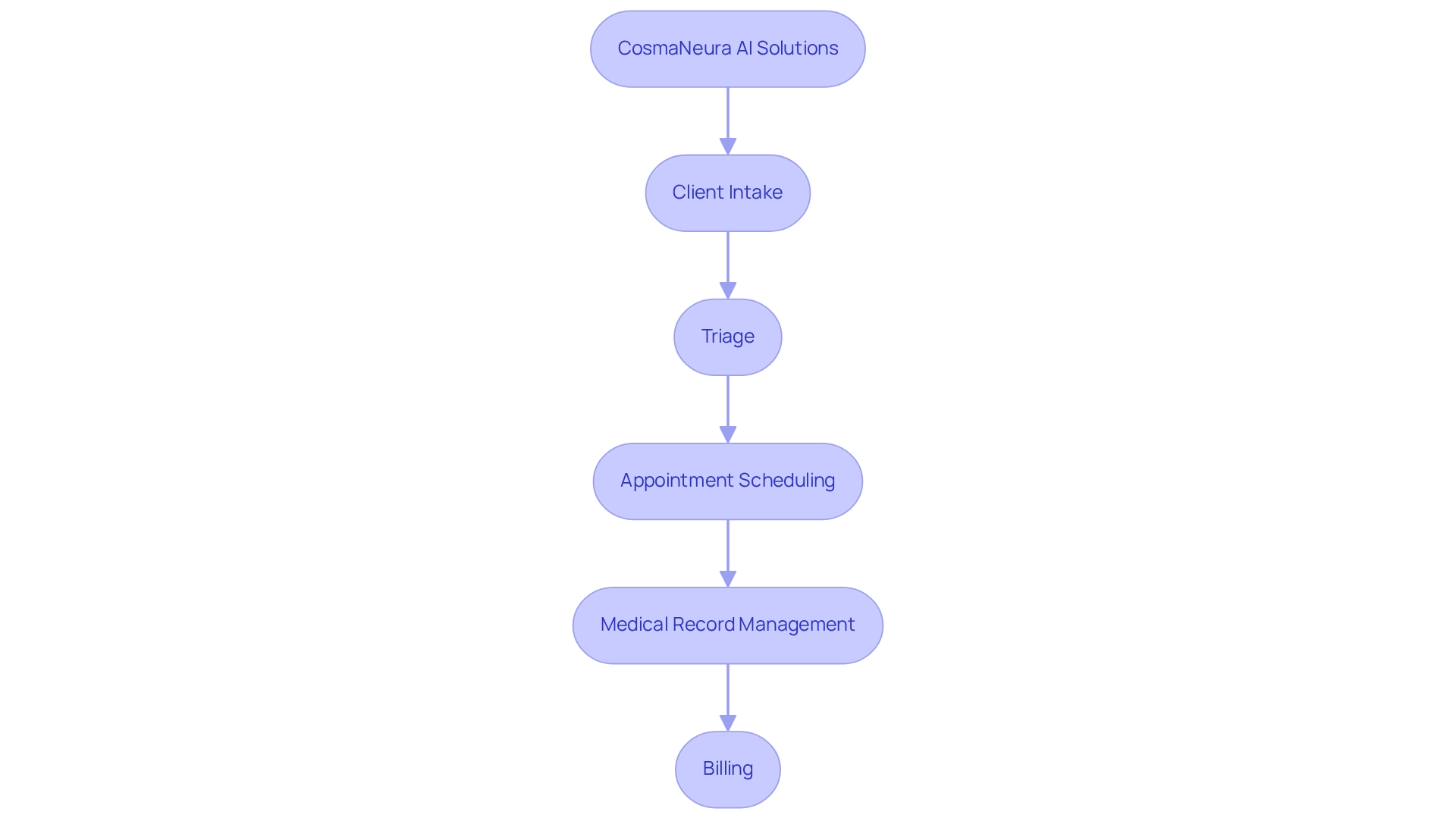
Ambience Healthcare: Specialty-Specific AI Scribe for Enhanced Clinical Documentation
Healthcare providers often face overwhelming that can detract from their ability to deliver quality . CosmaNeura understands these emotional challenges and offers a specialty-specific AI scribe designed to ease these pressures. This not only improves clinical records by capturing the nuances of various medical fields but also ensures that the and relevant.
Imagine regaining valuable time to focus on what truly matters—providing compassionate care to your patients. By automating labor-intensive tasks such as appointment scheduling and medical record management, allows you to concentrate more on delivering quality treatment. This approach not only enhances patient care but also helps to alleviate the stress that comes with administrative responsibilities.
Moreover, CosmaNeura's seamlessly integrate into existing processes, addressing the common resistance to innovation in the medical field. This integration eases concerns about maintaining the quality of service that patients deserve. As you explore the implementation of in your practice, consider how they can further enhance care for individuals while also reducing your stress. Are you ready to embrace a solution that prioritizes both patient care and your well-being? Discover how CosmaNeura can support you in creating a more efficient, compassionate healthcare environment.
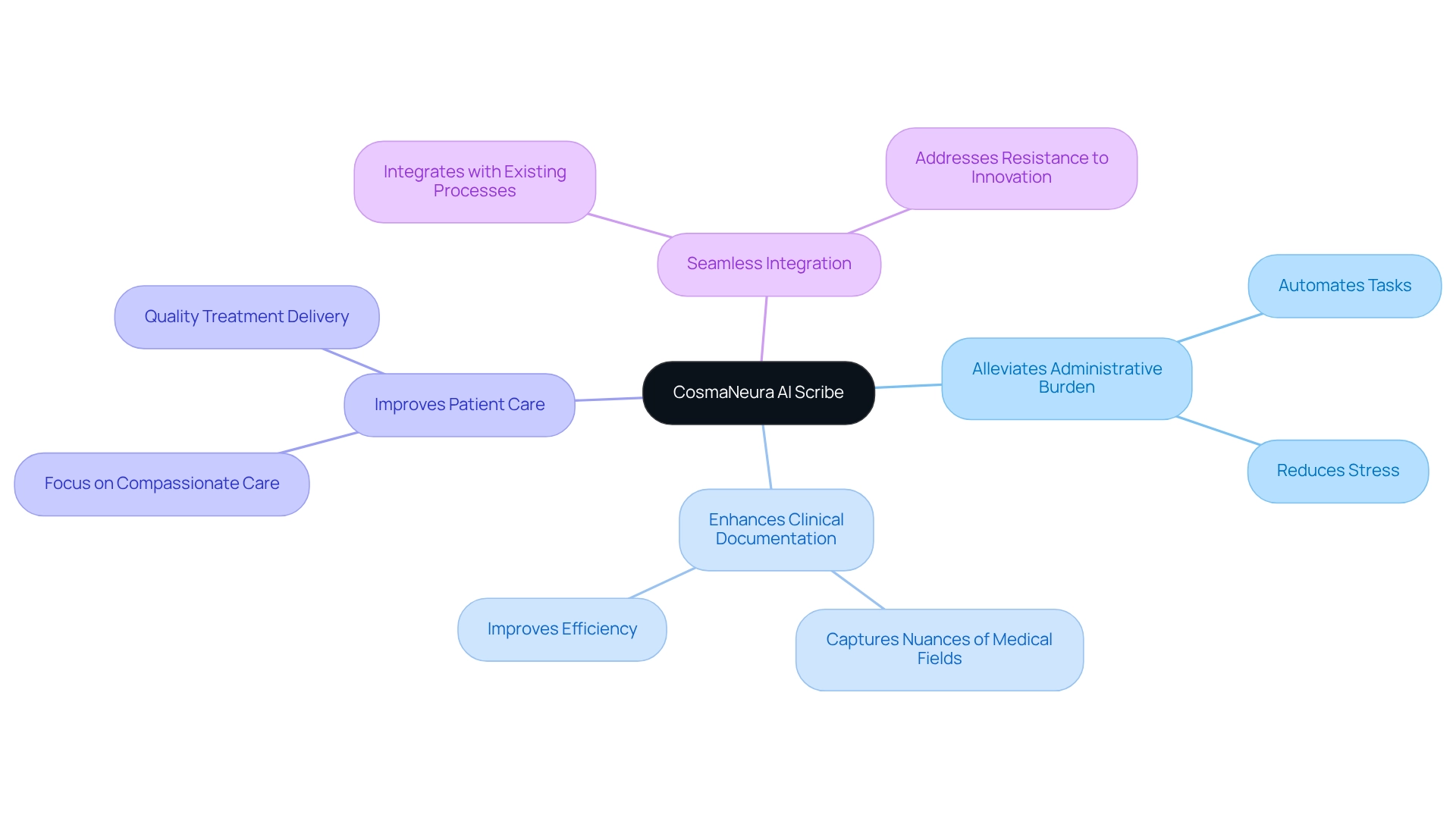
Suki: Advanced EHR Integration for Seamless Documentation Management
In today's healthcare environment, many providers face overwhelming emotional challenges. The burden of can take precious time away from , leading to feelings of frustration and burnout. Suki stands out as a compassionate solution, integrating seamlessly with electronic health records (EHR) to simplify record management.
By automating the note-taking process, Suki significantly reduces the time clinicians spend on administrative duties. This allows them to focus on what truly matters—connecting with their patients. Imagine a world where to their patients, enhancing the quality of care they deliver.
Suki not only enhances the precision of clinical records but also improves overall . In a landscape where fragmented support is common, Suki's solutions exemplify how can alleviate these burdens. By addressing the challenges of disjointed communication and coordination among providers, Suki helps create a more harmonious work environment.
Consider how much stress could be alleviated by simplifying records and reducing administrative overload. This ultimately leads to and better outcomes. Embracing tools like Suki can empower healthcare providers to reclaim their time and enhance their practice. Together, we can create a more supportive healthcare experience for both providers and patients.
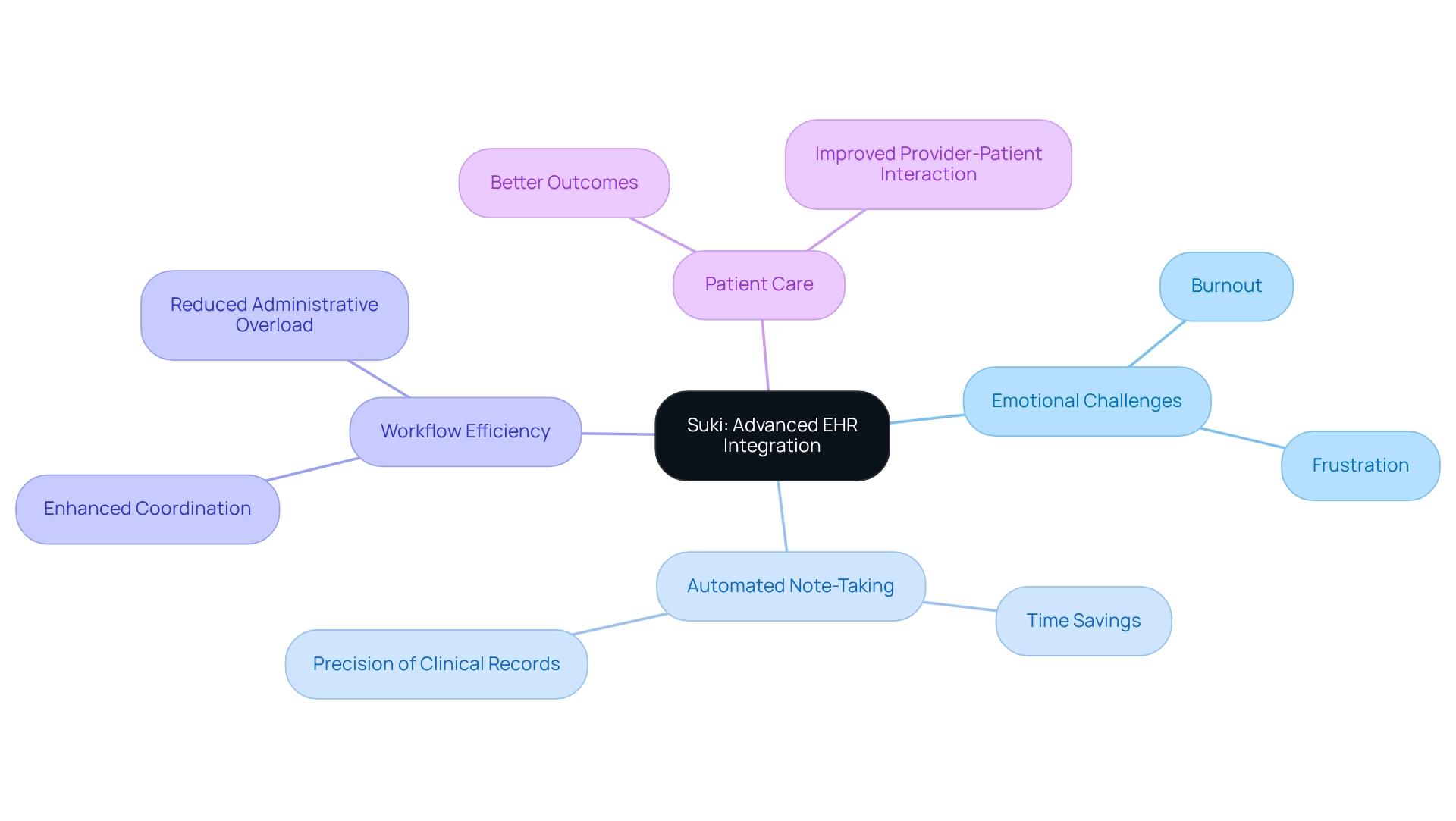
NEJM Catalyst: Insights on the Effectiveness of Ambient AI Scribes in Clinical Practice
Healthcare providers often face overwhelming emotional challenges, particularly when it comes to the burdens of record-keeping. According to NEJM Catalyst, have emerged as a promising solution, significantly alleviating this . Imagine being able to while also reducing the time spent on documentation. This shift not only enhances clinician satisfaction but also fosters with patients, underscoring the importance of maintaining the human touch in medical care.
However, it’s understandable that many encounter resistance from risk-averse doctors. They may hesitate to embrace these innovative AI solutions due to concerns about their effectiveness. By addressing these apprehensions thoughtfully, ambient listening AI can pave the way for a smoother integration of technology into clinical settings. This ultimately leads to improved individual treatment and supports medical startups in .
As we consider these advancements, let’s reflect on the potential for a more compassionate . How might alleviating the documentation burden transform your practice? By embracing these tools, we can ensure that technology enhances, rather than detracts from, the vital human connections that are central to patient care.
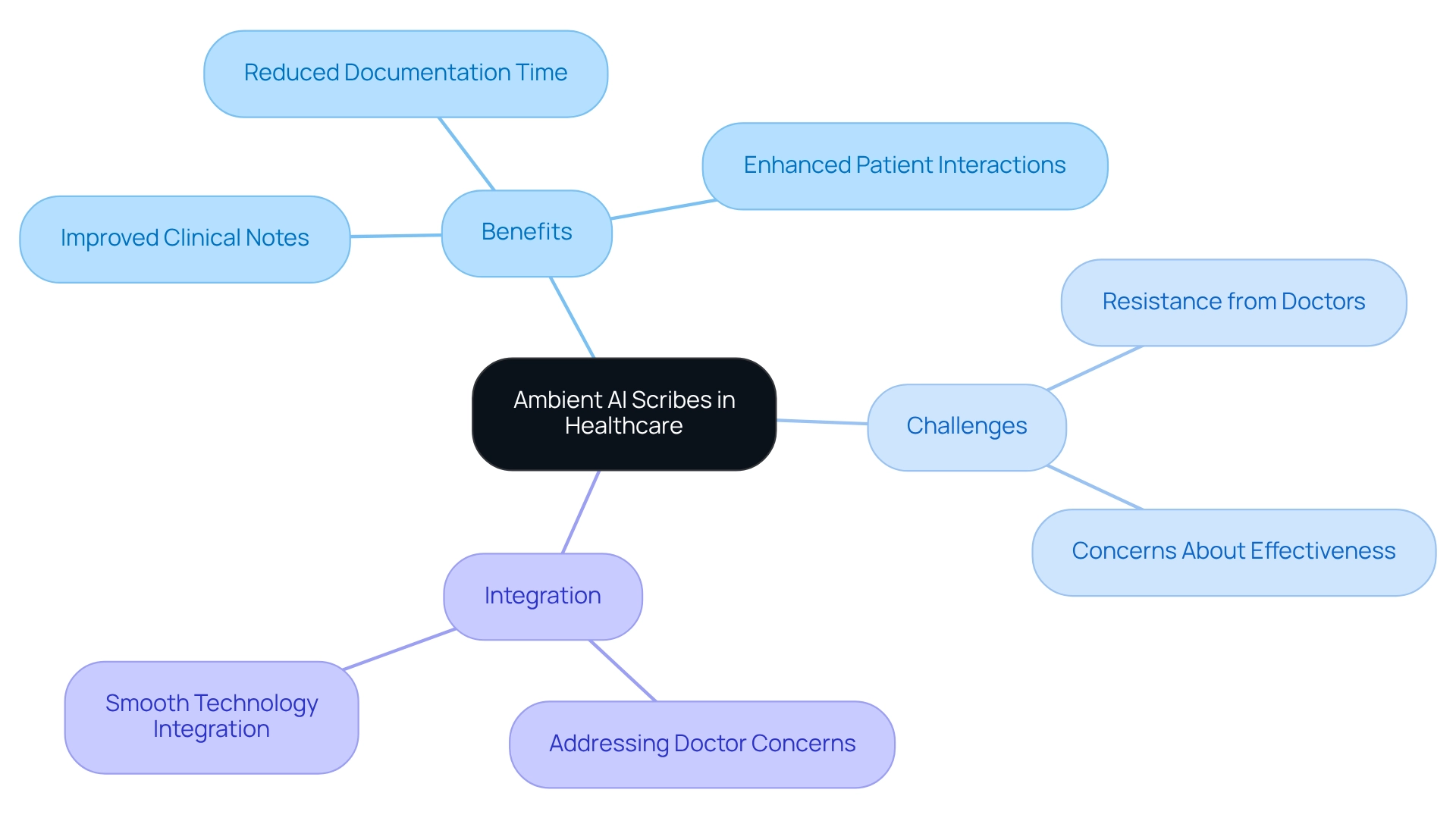
HealthTech Magazine: Clinician Perspectives on Ambient Listening Technology
HealthTech Magazine highlights the emotional challenges faced by clinicians regarding . Many healthcare providers express a favorable response, noting that these tools significantly reduce their . This relief allows them to dedicate more time to supporting their clients, an essential aspect of .
Imagine the difference this could make in your daily routine. By alleviating , ambient listening AI not only enhances but also boosts client satisfaction. This feedback underscores the potential of these tools to for both providers and patients alike.
As we advocate for more compassionate healthcare delivery, it’s crucial to consider how technology can support our mission. Embracing these innovations may be a step towards a more nurturing environment for everyone involved. How might your practice benefit from such advancements? Let’s explore the possibilities together.
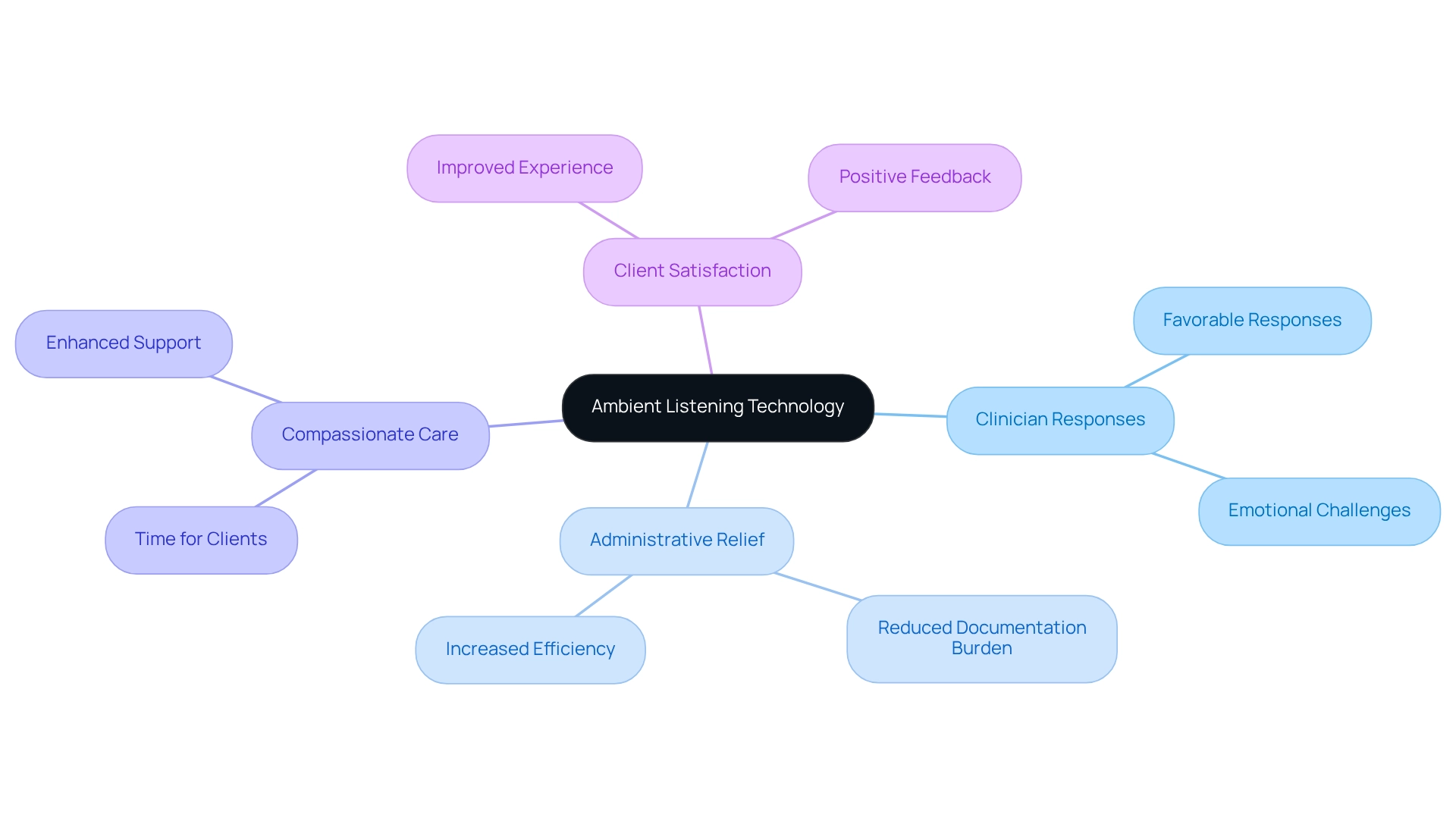
Epic Share: Enhancing Note-Taking Efficiency with Ambient Listening in Primary Care
In the demanding world of healthcare, providers often face emotional challenges that can hinder their ability to deliver the best care. Epic Share reports that has significantly improved in primary healthcare environments. By capturing real-time dialogues between healthcare providers and individuals, this technology allows for precise and thorough documentation, all while maintaining the essential flow of treatment.
Imagine the relief for physicians who can alleviate the burden of time-consuming , such as note-taking, appointment scheduling, and , by automating these processes. This not only helps them regain precious time but also allows them to focus on what truly matters—delivering high-quality service to their patients. Clinicians have observed that this enhancement not only saves time but also enriches the , highlighting the critical role of effective communication in medical settings.
However, it’s important to acknowledge that the medical industry often encounters resistance to innovation. Many providers feel apprehensive about embracing new technologies that could impact client treatment. Overcoming these challenges is essential for leveraging AI solutions like ambient listening AI to enhance both administrative efficiency and patient-provider communication. Consider these key benefits of ambient listening AI technology:
- Streamlined documentation without interrupting care
- Reduction of , allowing more patient focus
- Improved quality of interactions, fostering better communication
By embracing these advancements, healthcare providers can not only enhance their efficiency but also nurture the vital connections with their patients. Together, let’s explore how we can and create a more compassionate healthcare environment.
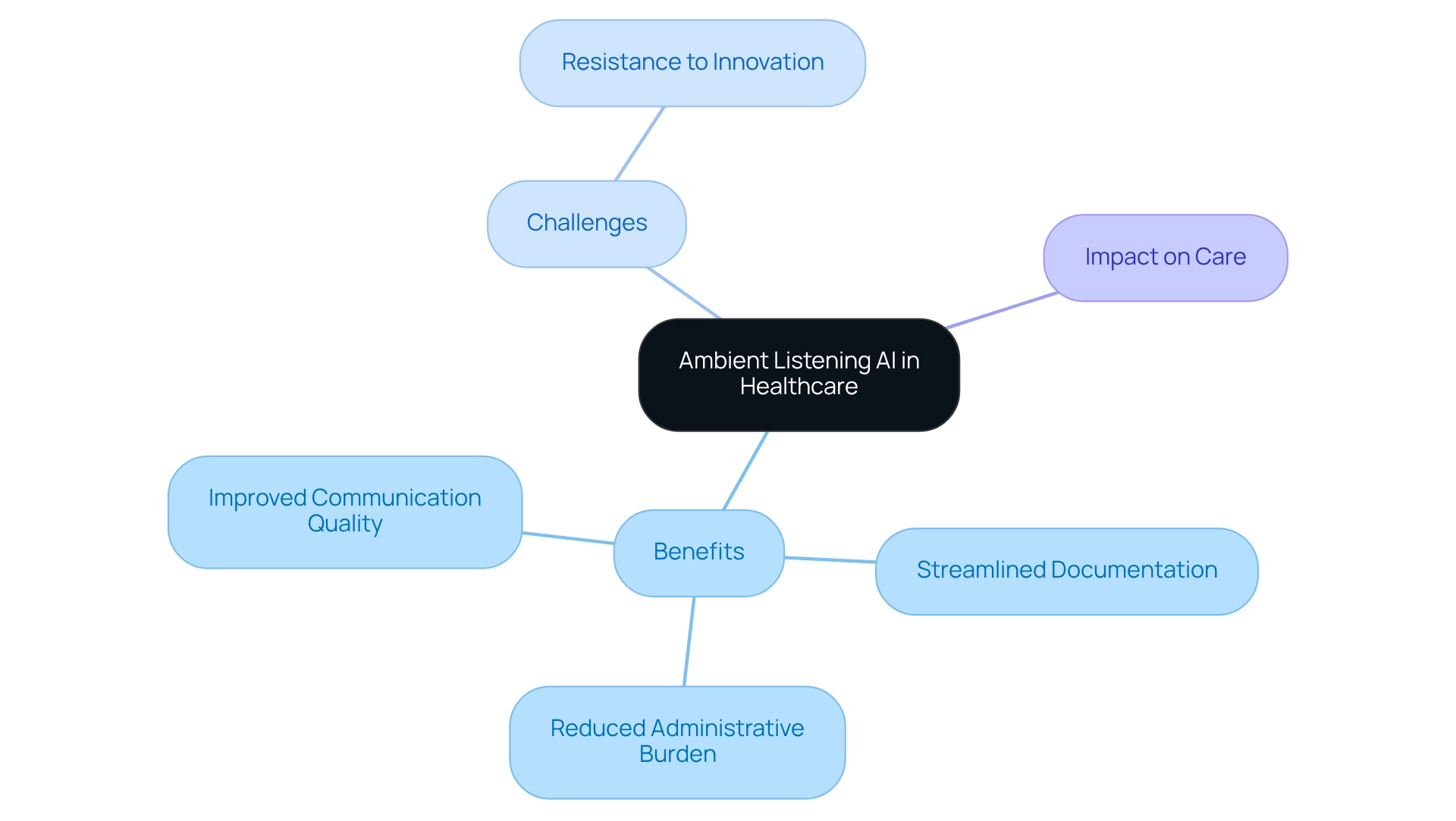
AMA Association: Practical Applications of AI Scribes in Healthcare Workflows
The AMA Association recognizes the emotional challenges faced by , particularly the burden of clinician burnout. emerge as a compassionate solution, automating routine documentation tasks and allowing to focus on what truly matters—the care of individuals. This shift not only enhances record accuracy but also elevates the overall .
Imagine a world where healthcare providers can dedicate their time and energy to their patients, free from the weight of . By alleviating these burdens, AI scribes address the concerns of risk-averse physicians, demonstrating how technology can foster compassionate and effective interactions with individuals. This innovation is not just a tool; it’s a pathway to overcoming resistance in the medical field.
As we embrace these advancements, let us reflect on how AI can transform our approach to . Are we ready to support our healthcare heroes in their journey towards a more fulfilling practice? Together, we can champion these changes, ensuring that every clinician has the opportunity to .
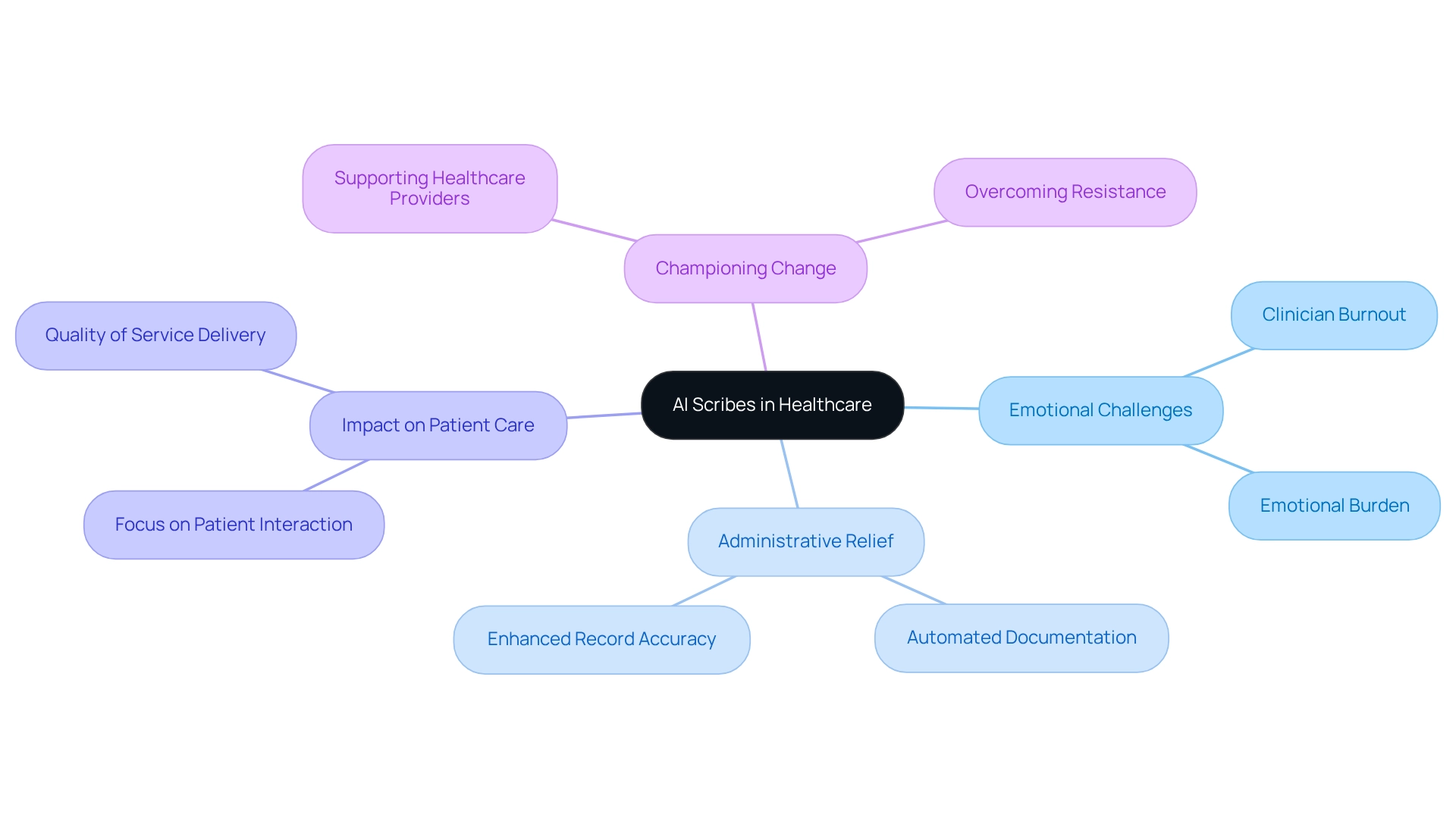
Catalyst NEJM: Challenges and Goals in Implementing Ambient AI in Healthcare
In the evolving landscape of healthcare, the implementation of presents both challenges and goals that resonate deeply with medical professionals. Many healthcare providers grapple with the emotional weight of ensuring data privacy, integrating new technologies with existing EHR systems, and the necessity of training staff to utilize these innovations effectively. These hurdles can feel overwhelming, especially when administrative burdens detract from the core mission of .
Yet, amidst these challenges, the primary goal remains steadfast: while prioritizing patient well-being. By addressing these issues, we can unlock the full potential of [ambient listening AI](https://blog.cosmaneura.com/7-ways-ai-for-therapy-notes-transforms-healthcare-efficiency), ultimately enhancing the delivery of medical services.
Imagine a future where technology alleviates the strain on healthcare providers, allowing them to focus more on their patients. This vision can become a reality, but it requires a collective effort to tackle the obstacles in our path. How can we work together to ensure that ambient listening AI serves as a tool for compassion and care? Let's engage in this important conversation and explore the possibilities that lie ahead.
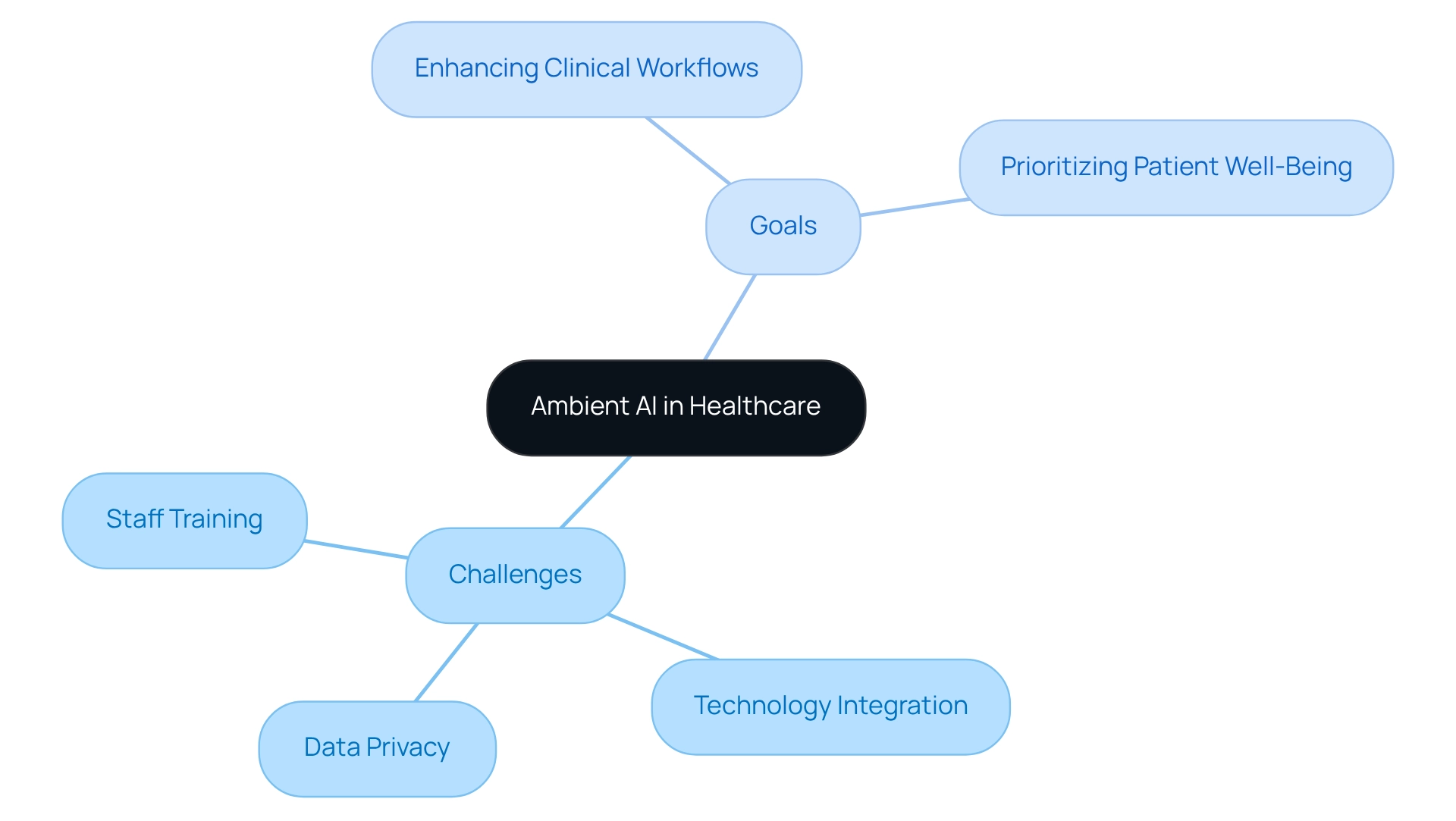
The Healthcare Blog: Innovations in Ambient Scribing Transforming Documentation
The Healthcare Blog sheds light on the innovative strides in , which is transforming record-keeping in the medical field. Have you ever felt overwhelmed by the administrative tasks that take time away from patient care? This technology offers , seamless integration with EHR systems, and the ability to adapt to clinician preferences over time.
By automating tedious documentation tasks, ambient scribing technology not only simplifies the process but also alleviates the . Many clinicians face challenges like service fragmentation and burnout, which can detract from the quality of care they provide. With this technology, clinicians can focus more on , ultimately improving experiences and outcomes for those receiving treatment.
These advancements ensure that the technology is tailored to meet the unique needs of healthcare providers. It paves the way for a more efficient, patient-centric healthcare delivery system. Embrace these changes and consider how they can support you in your vital work, allowing you to prioritize what truly matters: your patients.
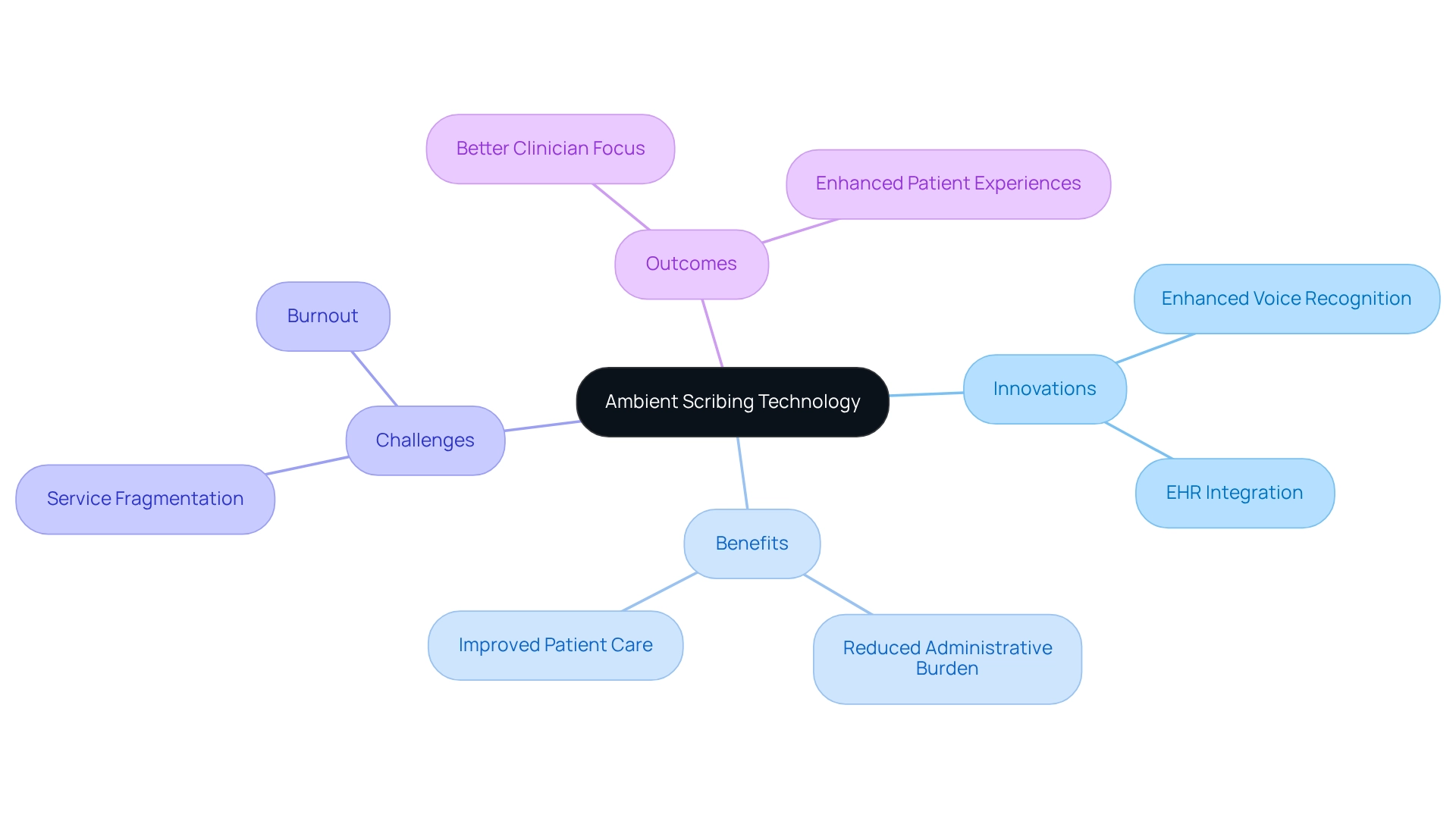
Acrconvergence Today: Clinician Experiences with Ambient Listening Technology
Acrconvergence Today shares the heartfelt experiences of clinicians with , shining a light on its positive impact on their workflow and interactions with individuals. Many clinicians express a sense of relief from , allowing them to engage more meaningfully with their clients.
Yet, it is essential to recognize that a significant portion of the medical field remains . Many physicians are understandably cautious about maintaining the quality of service and interactions with individuals, making it vital to address these concerns for the successful adoption of ambient listening AI technology.
This feedback highlights the potential of such technology to enhance both clinician satisfaction and patient care, aligning perfectly with our commitment to .
We invite you to reflect on how these advancements could transform your practice and improve your interactions with those you serve.
Conclusion
The integration of intelligent AI solutions in healthcare is paving the way for a transformative shift in how providers manage documentation and patient interactions. Through platforms like CosmaNeura, Suki, and ambient AI scribes, healthcare professionals can automate a range of administrative tasks, such as patient intake, note-taking, and appointment scheduling. This automation not only enhances workflow efficiency but also significantly reduces clinician burnout, allowing providers to dedicate more time to what truly matters—delivering compassionate patient care.
Moreover, advancements in AI technology, including specialty-specific applications and seamless EHR integration, ensure that healthcare documentation remains accurate and relevant. By addressing the common barriers to innovation, these tools foster a smoother transition into modern healthcare practices while maintaining the ethical standards that prioritize patient well-being. Feedback from clinicians reinforces the potential of these technologies to improve both job satisfaction and patient outcomes, highlighting the importance of maintaining the human touch in healthcare.
As the healthcare landscape continues to evolve, embracing these AI-driven solutions is essential for creating a more efficient, patient-centered system. By overcoming resistance to change and actively integrating these innovations, healthcare providers can enhance their practice, reduce administrative burdens, and ultimately improve the quality of care delivered to patients. The future of healthcare lies in the harmonious blend of technology and compassionate care, and the journey toward this vision is well underway.




